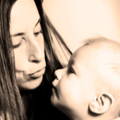If You Don’t Want More Children After Having Postpartum Depression, I Don’t Blame You

The first time (because there was a second) I suffered from postpartum depression was 13 years ago. I remember living through that period of hell as if it was yesterday, sitting and bawling for no apparent reason. I had a beautiful, healthy baby, a beautiful home, a wonderful partner, a nanny, supportive in-laws, and parents. I wanted for nothing. And yet, I couldn’t stop crying because life sucked and I was in such pain. It was a pain no one could see, but it hurt so deeply it made having the C-section look like a vacation. I called my daughter’s father at work, and he arranged a doctor’s appointment for me later that same day.
‘I can’t wait two hours for an appointment!’ I bawled, hyperventilating. ‘Something is really wrong with me. I need to go now!’ Why couldn’t I wait even 120 minutes to see a doctor? When you’re suffering from postpartum depression, you have thoughts. They are not good thoughts. I didn’t have thoughts of hurting my baby, but I had thoughts like, ‘Well, I’m just going to cross the road and deliberately not check for cars.’ I didn’t want to kill myself. ‘But, hey, if I just didn’t wake up.’
My daughter’s father took me to the doctor’s office, and I learned that if you want to get in and see the doctor immediately, all you have to do is show up in your pajamas with unbrushed hair and teeth, bawling your eyes out. They’ll take you into a private room right away. Who, after all, wants a woman who can’t control her tears, who may or may not be having a nervous breakdown, in your waiting room for all to see? God forbid people actually see what PPD looks like.
Thirteen years ago (which, really, is not that long ago) doctors didn’t seem, at least in my experience, to know anything about postpartum depression.
‘Anything new happen in your life recently?’ I was asked by the doc. ‘I had a baby!’ I sobbed. ‘Anything else?’ the doctor asked, brushing aside the fact that my beautiful two-month old had wreaked havoc on my hormones and my mind to the point where I was seriously sad.
I was prescribed anti-depressants. Many weeks of not being able to get out of bed followed. God, sleeping was good. So very, very good. When I slept, I didn’t have to think. Or talk to people. Or see people. So I slept. A lot. And I was always disappointed to wake up.
After many weeks, the fog lifted, and I was slowly returned to being human-like, if not quite myself. In fact, after having my daughter, I don’t think my brain has ever gone back to normal, to this day. Studies now show that 30 percent of women with postpartum depression are still depressed up to three years after giving birth. I’d say, for some women, you never fully get over PPD. I don’t think I have. I don’t think I ever will.
I was on a number of antidepressants for a few years following the birth of my first baby. So what’s a woman who suffered horribly from postpartum to do if she wants another baby? (There’s no guarantee that a past experience with PPD means you’ll get it again, but many studies say the chances are higher.) I wanted another baby badly, but was it worth it, if I was going to be smacked in the heart suddenly with postpartum depression again? Especially, knowing as I did, that it could last for months or years. Especially given that, unlike the first time around, I also had a child to care for.
Fear of postpartum depression blocked out all other concerns. I wasn’t terrified of not getting pregnant because of my advanced age, or worried about having another C-Section, or how I much weight I would gain. I didn’t even care who delivered my baby. I was worried that I would once again be hit with the indescribable feeling of PPD; a mix of sadness and failure and the knowledge that life is just so f***ing painful that, even with a magical baby, you still wonder if it’s a life you want to lead. And nothing anyone says will make you better. And you feel like a failure and you’re just so, so tired. And you think of what it would be like to just disappear and hide out somewhere, where no one could find you, for the rest of your life. That’s postpartum.
But babies are magical! So I took the chance, already kind of knowing that I had a higher chance of getting postpartum. My gut told me so. So I prepared. I started taking an anti-depressant, after a couple years of being anti-depressant free, while I was pregnant. I weighed the pros of taking medication while pregnant and they far outweighed the cons—like the possibility of having thoughts of walking in front of a moving subway. I told my partner to read up on postpartum, so he could know what it feels like, looks like, and what to say or, rather, what not to say.
Coinciding with the birth of my son, I hired a night nurse for six weeks so that I could get solid night’s sleep, which I knew I would need. I held strong when the lactation consultant came into my maternity room, saying ‘No thanks!’ to breastfeeding. It didn’t matter that she walked out in a huff. I needed to prepare everyone around me, so that they could feed the baby from a bottle, if, God forbid, I couldn’t get out of bed again. I hired a personal trainer. I scheduled therapy appointments in advance. All of this was very expensive. Was it worth it? Did it help? Well, yes and no.
Like a dark cloud appearing before a sudden rainstorm, it started to rain, at least emotionally for me, about three months after my son was born. I felt the depression coming on the same way you can feel a migraine slowly building. Unlike the first time, I wasn’t depressed 24/7. I wasn’t as tired, because I had help and could sleep. I had some good days. I had some awful days, too, when I couldn’t stop crying and wondered if I should check myself into the hospital. There were weeks I would lay in bed. And cry. Then sleep. Then cry again. But at least I knew what was happening. And I had no problem saying, ‘I have postpartum depression’ to my doctors, therapists, trainers. The planning did help, but it wasn’t fool-proof. Planning for a recurrence of PPD definitely helped, but mostly it was the knowing what to expect that got me through.
Of course, I love my children. I find them delightful and delicious. My children don’t know how I suffered. And I still have my days. Not just ‘bad mommy funk days,’ but days where I feel an overwhelming sadness that I never felt before I had children. It’s as if the postpartum depression, no matter how old my children are, keeps popping up like a bad pimple. I am convinced something happened to my brain when I had my babies.
It’s painful to have to factor in the possibility of PPD when you’re making a decision about whether to have a child. But if any mother said to me, ‘No, I’m not having more children, because I had such bad PPD.’ I would completely get it.
I had it…twice. And that’s two times too many.















Thank you for writing this. I didn’t have postpartum depression, but I know what you went through: I just can’t blame my daughter. When my daughter was 5 months old, we were in an auto crash that took our truck (and thus our camper) away for 9 weeks (literally the entire camping season was gone). We were all hurt in the crash, though my daughter healed very quickly. My husband & I were not so lucky: 4 years later we were still in daily physical pain and nearly 7 years later we still have some challenges. As if being in pain wasn’t bad enough, the only support we had was his mom, whose only offer of help was to take our – exclusively breastfed – daughter overnight. 🙁 It took me a few months to admit that I needed drugs, and a few more to find one that worked without interfering with nursing. Depression is absolutely horrible and I would not wish it on anyone. In one of the darkest moments, my mom brushed off everything I was feeling by saying “you have so much to be happy for, just be happy.” When our daughter was about 3, I weaned off the antidepressants, but not before we decided that we weren’t going to have another child. I don’t think that depression changes you: I *know* it does. I missed so many moments from my daughter’s early years: blurred in a fog of physical and emotional therapy, and muted by the drugs. PPD is no joke, and I applaud you for your willingness to have a second child. My situation was different, and we weren’t able to beat our demons and produce another child. I know that the depression changed me, but I also have a lot of anger, because I can put a face to the cause of my problems. 🙁 There’s tons of awesome things about only having one child but it wasn’t our plan and when your plan is taken away from you, it leaves a hole that can never be filled.
I think being open about depression is important. I also don’t think it ever goes away completely. Sending you strength and love when you need it.
Wonderfully written piece. You have captured how I felt when we decided to go for #2. We prepared too, but no amount of preparation can really get you ready for whatever form PPD takes. Once the meds kicked in a bit, good friends, loving family, and daily exercise got me back to feeling more like myself .
Thank you for this article. I feel like I only want my daughter and no other children. The looks I get when I tell family we are only having one, I can tell they are judging me. My ppd was terrible. I took cbd oil to help me get out of it. You are right about the ER. I had to go in because my c section incision opened. I was bawling when I arrived and that is the fastest I’ve ever been taken back!
I struggled with mild to severe depression since my teen years and had medication twice between age 20 and 30. I was scared to have children for that reason, not wanting to pass that on to them. I got healthy and had a baby at 34. Depression started while I was on mat leave, even before she was born. It got worse after labour, I couldn’t even have people visit in hospital. I just wanted everyone to go away because I couldn’t stop crying and was afraid of criticism. I couldn’t cope and was wracked with anxiety and insomnia. It ended up being 3 years of darkness and trying to hide my mental state for fear everyone would think I was unfit to keep my daughter. It was a slow, medicated climb out and I still fall back once in a while. By the time I felt normal enough to consider having another baby, it was too late for me.
Thank you for writing about your experience with PPD. It helps to not feel alone. 12 years ago when I had my first child, my daughter, I too was diagnosed with PPD. I didn’t even realize that how I was feeling and acting was depression. I felt sad, crying all the time, inadequate as a mother, unable to make any decisions, angry over small things and like I was in a darkness where there was no light. I went on medication and it helped. I was still on medication when we chose to have another child 3 years later. My depression continued after my son was born and has never gone away. I have better days then others and have been able to manage it with medication and therapy, but I still have depression. I would never regret having my kids, even though my depression has never left me. I think doctors still do not understand PPD. My depression was triggered by the birth of my daughter and has never gone away. I just use medication and tools I have learned to manage it. Some days are better then others. I think there needs to be more research into PPD and the lasting effects on woman. Thank you again for talking about this. More woman deal with PPD then will admit, and the more we talk about it Hopefully, the more we can extinguish the shame,